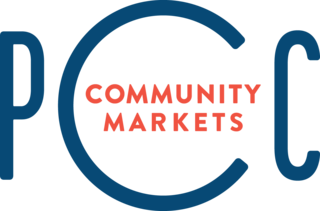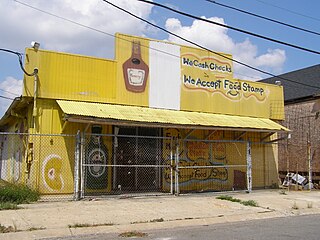Related Research Articles

Oakland is the academic and healthcare center of Pittsburgh and one of the city's major cultural centers. Home to three universities, museums, hospitals, shopping venues, restaurants, and recreational activities, this section of the city also includes two city-designated historic districts: the mostly residential Schenley Farms Historic District and the predominantly institutional Oakland Civic Center Historic District, as well as the locally-designated Oakland Square Historic District.

East Oakland is a geographical region of Oakland, California, United States, that stretches between Lake Merritt in the northwest and San Leandro in the southeast. As the southeastern portion of the city, East Oakland takes up the largest portion of the city's land area.

West Oakland is a neighborhood situated in the northwestern corner of Oakland, California, United States, situated west of Downtown Oakland, south of Emeryville, and north of Alameda. The neighborhood is located along the waterfront at the Port of Oakland and at the eastern end of the San Francisco–Oakland Bay Bridge. It lies at an elevation of 13 feet.

Lucky Stores is an American supermarket chain founded in San Leandro, California, in 1935. Lucky is currently operated by Albertsons in Utah and Save Mart Supermarkets in Northern California.
Oaksterdam is a cultural district on the north end of Downtown Oakland, California, where medical cannabis is available for purchase in cafés, clubs, and patient dispensaries. Oaksterdam is located between downtown proper, the Lakeside, and the financial district. It is roughly bordered by 14th Street on the southwest, Harrison Street on the southeast, 19th Street on the northeast, and Telegraph Avenue on the northwest. The name is a portmanteau of "Oakland" and "Amsterdam," due to the Dutch city's cannabis coffee shops and the drug policy of the Netherlands.

PCC Community Markets is a food cooperative based in Seattle, Washington. With over 58,000 members, it is the largest consumer-owned food cooperative in the United States. Both members and non-members may shop at the retail locations, but members receive certain discounts. The organization currently operates fifteen retail locations. Eight of the fifteen stores are located in Seattle. The West Seattle location reopened on October 2, 2019. The other seven are located in Issaquah, Kirkland, Burien, Bothell, Redmond, Edmonds and Bellevue.
Montavilla is a neighborhood in the Northeast and Southeast sections of Portland, Oregon, United States, and contains an area east of Mount Tabor and west of Interstate 205, from the Banfield to SE Division. It is bordered by North Tabor, Mount Tabor, South Tabor, Madison South, Hazelwood, and Powellhurst-Gilbert.

Eastmont Town Center is a shopping mall and social services hub located on 33 acres (130,000 m2) bounded by Foothill Boulevard, Bancroft Avenue, 73rd Avenue, and Church Street, in the Frick neighborhood of East Oakland. The mall opened in phases between 1966 and 1974 on the site of a 1920s-era Chevrolet automobile factory called Oakland Assembly. Architect William Pereira designed the building. It is physically almost next to, and by entry access a few blocks away from the similarly sized Evergreen Cemetery. The official grand opening ceremony was held in November 1970.

Rockridge Market Hall is a market hall opened in 1987 in Rockridge, a neighborhood of Oakland, California. It contains nine stores, including a caterer, a specialty foods shop, a flower shop, a wine shop, a produce shop, a coffee roaster, a fish shop, a butcher shop and a bakery. The food hall is across from the Rockridge BART station. The neighborhood is noted for its concentration of upscale retail and food establishments.

Prescott is a residential neighborhood and commercial district in West Oakland in Oakland, California. The neighborhood boundaries are Mandela Parkway to the east, 7th Street to the south, West Grand Avenue to the north, and Frontage Road to the west.

Supermarket shortages have been identified in many American urban neighborhoods, and such gaps in food access have been closely correlated with diet-related diseases such as cancer, obesity, and diabetes. The shortage began when many supermarkets left mixed-income central city neighborhoods after civil disturbances in the late 1960s and 1970s. By 1984, store openings exceeded closings nationally, but the opposite held in cities; and the trend continues. The reluctance of large chains to open in urban areas is termed by some activists, "supermarket redlining."
Oakland City is a neighborhood in southwestern Atlanta, Georgia, just southwest across the BeltLine from West End and Adair Park.

Google Slides is a presentation program included as part of the free, web-based Google Docs suite offered by Google. Google Slides is available as a web application, mobile app for: Android, iOS, and as a desktop application on Google's ChromeOS. The app is compatible with Microsoft PowerPoint file formats. The app allows users to create and edit files online while collaborating with other users in real-time. Edits are tracked by a user with a revision history presenting changes. An editor's position is highlighted with an editor-specific color and cursor and a permissions system regulates what users can do. Updates have introduced features using machine learning, including "Explore", offering and "tasks to other users.

Urban agriculture in West Oakland involves the implementation of Urban agriculture in West Oakland, California.

Mandela Partners, formerly Mandela MarketPlace, is a non-profit organization in Oakland, California, that works to aid low-income communities in improving access to food and healthcare resources.

Google Sheets is a spreadsheet application included as part of the free, web-based Google Docs Editors suite offered by Google. Google Sheets is available as a web application; a mobile app for: Android, iOS, and as a desktop application on Google's ChromeOS. The app is compatible with Microsoft Excel file formats. The app allows users to create and edit files online while collaborating with other users in real-time. Edits are tracked by which user made them, along with a revision history. Where an editor is making changes is highlighted with an editor-specific color and cursor. A permissions system regulates what users can do. Updates have introduced features that use machine learning, including "Explore", which offers answers based on natural language questions in the spreadsheet. Sheets is one of the services provided by Google that also includes Google Docs, Google Slides, Google Drawings, Google Forms, Google Sites and Google Keep.

Google Docs is an online word processor included as part of the free, web-based Google Docs Editors suite offered by Google, which also includes Google Sheets, Google Slides, Google Drawings, Google Forms, Google Sites and Google Keep. Google Docs is accessible via an internet browser as a web-based application and is also available as a mobile app on Android and iOS and as a desktop application on Google's ChromeOS.
The Food Justice Movement is a grassroots initiative which emerged in response to food insecurity and economic pressures that prevent access to healthy, nutritious, and culturally appropriate foods. It includes more broad policy movements, such as the Food and Agricultural Organization of the United Nations.

District Grocery Stores (DGS) was a cooperative of small single-room grocery stores in Washington, DC, Maryland and Northern Virginia. It operated from 1921 to 1972. The goal was to leverage the volume of purchasing power of the cooperative to negotiate better prices from wholesalers and therefore improve their competitiveness. The cooperative started with 20 members and grew to 300 members at its peak, most of whom were Jewish immigrant families from Europe. The stores were located across the Washington metropolitan area.
References
- ↑ "Google Docs". docs.google.com. Retrieved 2024-02-03.
- ↑ "MO' BETTER FOOD -Grocery Stores" . Retrieved 16 February 2016.